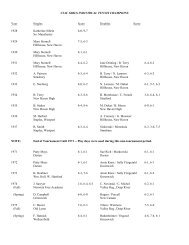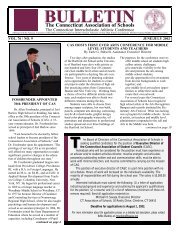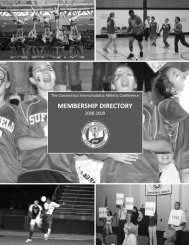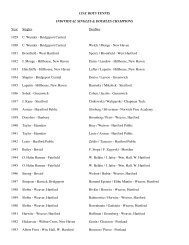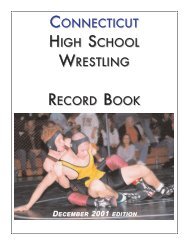BULLETIN BULLETIN - www.casciac.org!!
BULLETIN BULLETIN - www.casciac.org!!
BULLETIN BULLETIN - www.casciac.org!!
You also want an ePaper? Increase the reach of your titles
YUMPU automatically turns print PDFs into web optimized ePapers that Google loves.
12<br />
CAS Bulletin<br />
O At its March 21st meeting, the<br />
CIAC board voted to continue the<br />
40% qualifying standard for the<br />
2002 baseball tournament. The 40%<br />
standard was put in place, on a trial<br />
basis, during 2001 tournament season.<br />
Because the change allowed for<br />
a better balance in the number of<br />
teams in each of the four divisions,<br />
the board voted to continue the new<br />
standard in the current year.<br />
O Also at its March 21st meeting,<br />
the CIAC board voted to allow<br />
spring practice to continue in the<br />
sport of football. Board members<br />
based their decision, in part, on the<br />
results of a survey of coaches concerning<br />
this issue. Ninety-five percent<br />
of the 127 coaches who completed<br />
the survey expressed a desire<br />
to continue spring practice. The<br />
board granted the continuance of<br />
spring football practice with the<br />
stipulation that students participating<br />
in a spring sport must complete<br />
their season before participating in<br />
spring practice.<br />
O The Annual Survey of Football<br />
Injury research reported eight fatalities<br />
directly related to football during<br />
the 2001 season. That figure<br />
represents an increase from three<br />
fatalities in the 200 season. Of the<br />
eight, seven of those deaths happened<br />
at the high school level while<br />
participating in game competition.<br />
Five resulted from an injury to the<br />
brain, one from a fractured neck and<br />
one from a ruptured spleen.<br />
O At least four schools in the New<br />
England Small College Athletic<br />
Conference are adjusting their<br />
admissions policies away from athletics<br />
and back toward academics.<br />
Williams, Amherst and Wesleyan<br />
colleges have all agreed to cut the<br />
number of "tips" -- or athletes<br />
admitted despite sub-par academic<br />
records -- in a single year to 66.<br />
Bowdoin College also plans to<br />
reduce athlete admissions, but has<br />
not provided a maximum number.<br />
While these schools offer high-level<br />
academic programs, their athletic<br />
teams are also competitive. The<br />
adjustment is at least in part a<br />
ciac news<br />
response to a recent book by James<br />
L. Shulman and William G. Bowen,<br />
"The Game of Life: College Sports<br />
and Educational Values," which<br />
argues that elite colleges and larger<br />
universities make similar compromises<br />
for their athletic programs.<br />
Meanwhile, in the Ivy League, university<br />
presidents have asked their<br />
athletic directors to consider reducing<br />
the size of squads in several<br />
sports. [The Chronicle of Higher<br />
Education, 3/8/02]<br />
O CHARACTER COUNTS!<br />
Sports of the Josephson Institute for<br />
Ethics has just published a document<br />
called "Pursuing Victory With<br />
Honor: A Game Plan for Amateur<br />
Basketball." It resulted from a summit<br />
of many of the nation's most<br />
influential leaders in collegiate and<br />
high school basketball, and sets<br />
forth principles and standards for<br />
sportsmanship and character building.<br />
You can download a FREE<br />
copy from the Character Counts!<br />
web site at <strong>www</strong>.charactercounts.<strong>org</strong>/<br />
sports/gameplan-basketball.pdf. Or<br />
you can receive a Word version of<br />
the document by e-mailing Charac -<br />
terCountsSports@jiethics.<strong>org</strong> and just<br />
inserting the words "Game Plan" in<br />
the subject line.<br />
Bats with BESR Standard Legal<br />
Immediately in High School Baseball<br />
INDIANAPOLIS, IN (April 9, 2002) - Effective immediately, any<br />
bat that meets the Ball Exit Speed Ratio (BESR) performance<br />
standard (BESR certification mark on the bat) is legal for high<br />
school baseball competition governed by<br />
National Federation of State High School Associations rules.<br />
In June 2001, the NFHS Baseball Rules Committee voted<br />
that all non-wood bats must have the BESR certification mark<br />
to be legal for high school baseball, effective January 1, 2003.<br />
Since many bats with the BESR standard are already on the<br />
market, this interpretation by the NFHS allows those bats to be<br />
used in the 2002 high school season. "When purchasing bats,<br />
individuals can now be assured that no matter what materials<br />
are used in the bat composition, if it has the BESR certification<br />
mark, it is legal," said Elliot Hopkins, NFHS assistant director<br />
and liaison to the Baseball Rules Committee. "Whether the bat<br />
composition is titanium, ceramic or whatever, if it has the<br />
BESR mark, it can be used immediately."<br />
Hopkins said that bats with the BESR mark still are not<br />
required until January 1, 2003. Bats that are legal by current<br />
rules still can be used for the 2002 season; however, all bats<br />
must have the BESR mark for the 2003 season.<br />
The BESR mark ensures a maximum exit speed of 97<br />
miles per hour and that the bat has met the moment-of-inertia<br />
requirement. In addition, bat rules that were changed for the<br />
2001 season, which are also a part of the BESR standard,<br />
have the following requirements: maximum of 2 5/8 inches for<br />
the diameter of the bat barrel and a minus-3 differential<br />
between the length and weight of the bat (a 33-inch-long bat,<br />
for example, cannot weigh less than 30 ounces).<br />
All recent changes in bat requirements have been to minimize<br />
the risk of injury to high school student-athletes, and<br />
maintain the balance between offense and defense and keep<br />
within the sound traditions of the game.<br />
NF Publishes brochure on foreign student eligibility<br />
The National Federation has published a brochure that is designed to educate foreign students<br />
wishing to gain athletic eligibility at a high school in the United States. Recognizing that the<br />
international student provides a very valuable asset to high school athletics, the brochure offers<br />
suggestions for successfully obtaining and keeping athletic eligibility. It advises students to ask<br />
questions before taking part in any activity that may jeopardize eligibility. It also warns students<br />
to be cautious of who they allow to help them in their attempt to play athletics, as some<br />
individuals are just trying to recruit players to a certain school.<br />
The brochure was developed by the NF International Student Task Force which was created in<br />
2001 to address the growing concerns over the proliferation of international students coming<br />
into the U.S. to compete in high school athletics. The task force also amended an NFHS bylaw<br />
that prohibited any member of a school's staff from serving as a host family for an international<br />
student. A change was made to prohibit any member of the school's coaching staff, paid or voluntary,<br />
from acting as a host to a student.<br />
The NF will work together with the Council for Standards on International Educational Travel<br />
(CSIET) to promote the available information and resources to prospective athletes to help<br />
eliminate eligibility conflicts. The brochure is available for download through the NF website<br />
at http://<strong>www</strong>.nfhs.<strong>org</strong>/PDF/IntstudentbrochureR3.pdf. The brochures can also be purchased in<br />
packs of 50 for $7.50.



